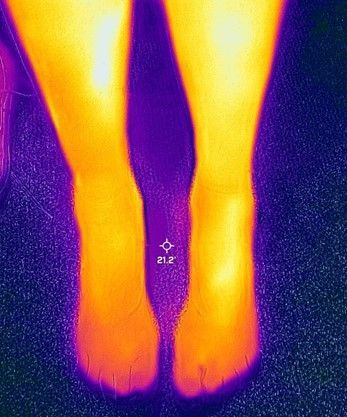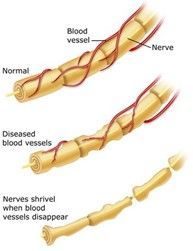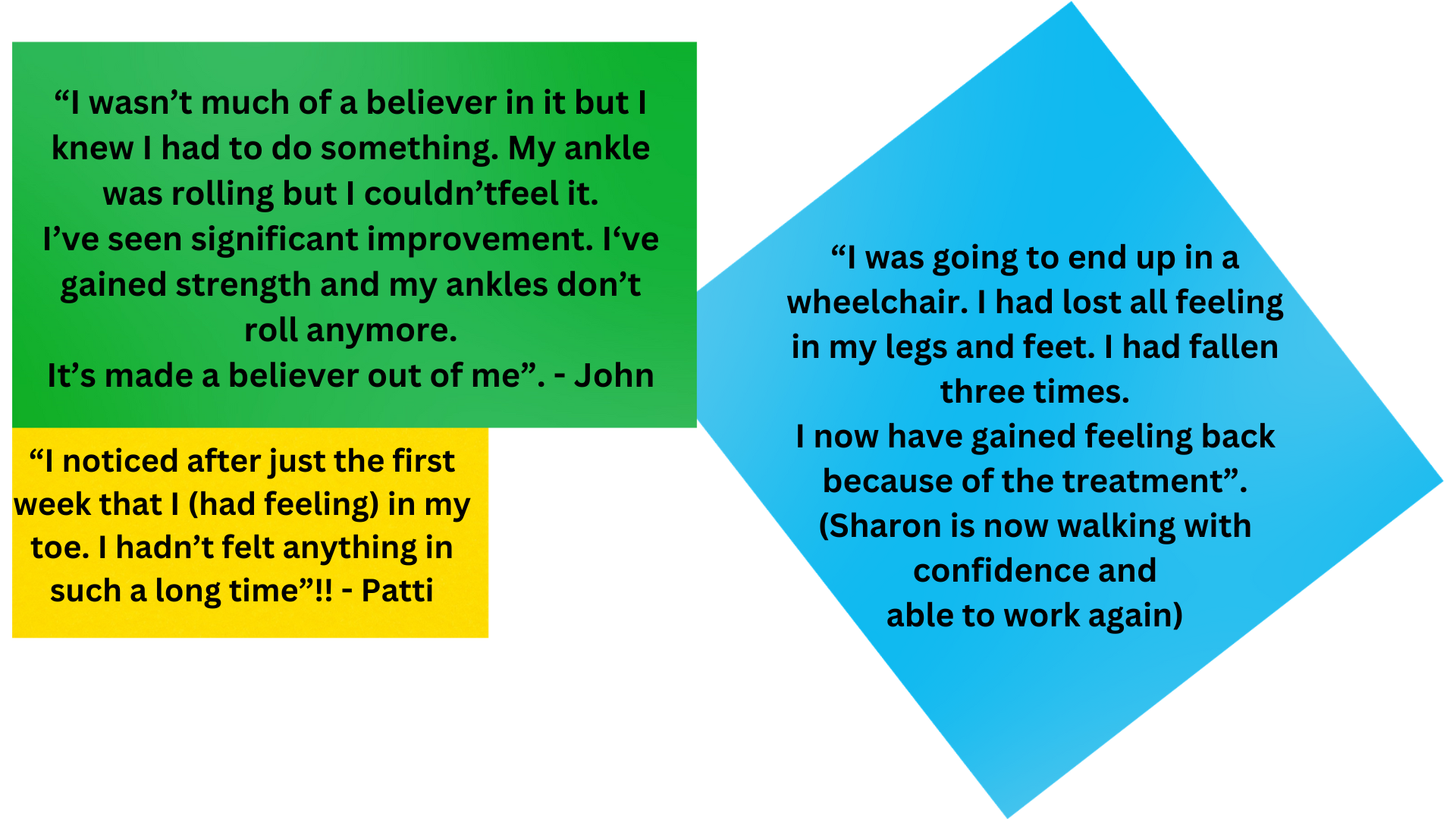How Can Neuropathy Treatment Help Me?
We understand that you or a loved one may be struggling with neuropathy type symptoms.
These symptoms appear in a variety on discomforts. These include but are not limited to: pain, numbness, tingling, burning sensation, cold sensation, swelling, tightness, cramping, balance issues, sleep disturbances, and/or discoloration on the skin.
WHAT IS NEUROPATHY ?
Neuropathy (peripheral or other) is any form of nerve damage that begins when the body’s nerves are breaking down faster than the body can heal them. Unfortunately, neuropathy is a progressive disorder and will continue to spread throughout the body and symptoms will continue to get worse without intervention. Neuropathy typically starts in the toes and will work its way up through the legs. Symptoms may also begin in the hands and work up the arms.
Many people have the belief that neuropathy is linked to diabetes only. Though 80% of diabetics have been diagnoses with neuropathy, there are hundreds of sources that cause nerve damage. Injury, surgery, medications, illness, chemo/radiation, genetics, auto- immune conditions, infections, vaccines, viruses such as COVID all have been proven links to nerve damage. There are over 30 million Americans and in growing rapidly
HOW DO I KNOW IF I HAVE NEUROPATHY?
The first indicator is to assess your symptoms.
Pain, sleep disturbances, cramping, and discoloration can have many underlining issues. However, if the symptoms consist of numbness, tingling, burning, and/or coldness, these symptoms are directly correlated to nerve damage. Only nerves that are damaged would send these signals to your brain to alert you that they are damaged.
Here at One Degree Functional Health, we offer free nerve screenings. In these screenings, we take thermal pictures of you feet (and hands if symptoms have progressed). This will show us the amount of blood flow through the nerves. Lack of blood flow is a great indicator of nerve damage.

Bright Yellow = adequate blood flow
Orange - compromised blood flow
Purple = lack of blood flow
I've been told there's no hope for healing nerves
This is a common concern we hear. The common care for damaged nerves is to first test the large blood vessels through a doppler ultrasound. Unfortunately, circulation to the nerve is often hindered by the small blood vessels that wrap around the nerve.
Dopplers do not measure those vessels and many times result in a “normal” reading when there is blood flow issues.
The only option given to many patients is to live with the symptoms until they worsen to an unbearable level. At that point, medication - such as Gabapentin, Lyrica, Cymbalta, and others are prescribed to mask the symptoms.
These medications fall under a classification called anticonvulsive. These are not pain meds but seizure medications. The purpose of the medication is to slow the brain activity down. Unfortunately, many neurologists and primary care physicians prescribe this medication to neuropathy patients in hopes that your brain will slow to a point of not recognizing the pain signals your body is giving.
As your body fights through the slow pathways of the brain to alert you that something needs attention, the only option given is to up the dose to confuse the body more. This is why many experience harsh side effects such as confusion, mood swings, balance issues, lethargy, and physical illness. These medications have also been directly linked to cause neuropathy to progress placing you in a dangerous cycle of masking a symptom with a chemical that is causing that symptom to worsen.
There is the option of invasive surgeries that are offered. These surgeries consist of a nerve transfer (cutting the nerve path to reroute it in hopes it gets more blood flow), radiofrequency ablation (heating small area on inner tissue to destroy the nerve completely changing pain to complete numbness), or, if a diabetic, a possible amputation of the foot (removal of problem area in hopes of preventing further diabetes complications).
What we do different
The testing we do is a very detailed exam. This consists of, not only checking the large blood vessels, but making sure the small vessels that wrap around the nerve are healthy. Our staff will also conduct a specific sensory exam to determine the percentage of nerve damage that you are currently at.
A nitric oxide level will be tested as this is an essential nutrient to heal. A motor test may be performed if your neuropathy has progressed to hindering your large motor skills. In order for your case to be understood fully - other test such as xrays or metabolic tests may be performed in office as well.

Treatment at One Degree Functional Health
Our treatment plans are designed for each specific patient in what their nerves need to heal. The main components include stimulating the nerve, increasing blood circulation, and giving the nerve proper nutrition. We utilize technology discovered by NASA to produce a process called angiogenesis (building of new blood vessels).
We have programs that can be done in the comfort of your own home or ones that combine your home therapies with the technology in our office to see faster results. Though healing takes time, we make realistic goals with our patients for them to work towards in 90 days, 6 months, and 1 year. With your commitment, we as a staff become dedicated to helping you reach each goal.
We have a 97% success rate in not only stopping the progression of nerve damage but restoring nerves that had tested as damaged.
You can see our patient’s victories in reaching their goals on our Face Book Page or check out our patient's Testimonials!

ADDRESS
All Rights Reserved | One Degree Functional Health
CLINIC HOURS
Monday 9:00-12:00 2:00-4:30
Tuesdays 9:(309) 698-2500:00 (therapy closed)
Wednesday 9:00-12:00; 2:00-4:00
Thursday 9:00-12:00; 2:00-4:00
Friday 9:00-12:00 (therapy closed)

